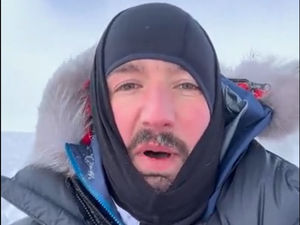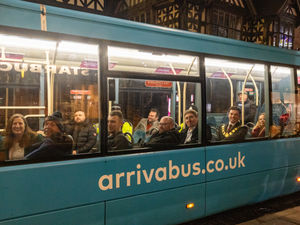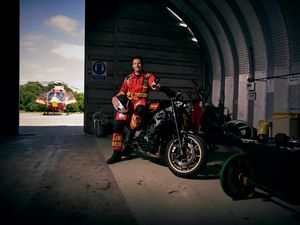Claire's cutest little birthday boy
For just a few hours Claire Deacon had the perfect baby boy. But as she cuddled him she noticed something wasn't quite right and doctors quickly diagnosed Down's syndrome. Rebecca Lawrence meets a little chap with a winning smile.
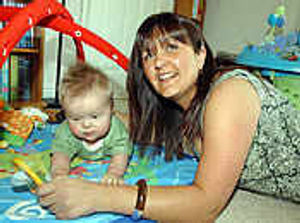
But when little George was born on June 11 last year to Claire, 33, and her partner Wayne Price, 31, he was diagnosed with the condition, which is caused by the presence of an extra chromosome.
"We were extremely shocked and upset," she says at her home on the Telford Estate in Shrewsbury.
"It was like it was happening to someone else. The first few hours I was all elated - like I felt when I gave birth to my daughter Esme - and all of a sudden it was completely turned around."
Claire noticed something about George's eyes and saw his palm had a single crease across it, a common characteristic of Down's syndrome. A midwife had also recognised the signs.
"By then, he was in an incubator because he could not maintain his body temperature or feed, which is something babies with Down's syndrome struggle with," she says.
George was also born with a congenital heart condition and had to have open-heart surgery - spending his first Christmas in Birmingham's Children Hospital.
"Neither of us knew anyone with Down's or much about it," remembers Claire. "We only had our preconceived ideas. They gave us lots of information at the hospital which I struggled with, as I could not face it.
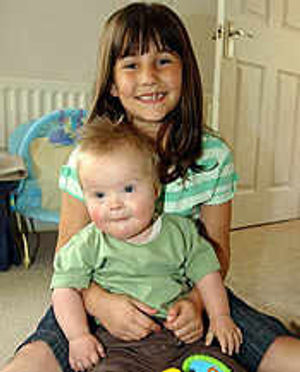
But gradually Claire has come to terms with George's condition with the help of several support groups in Shropshire as well as various websites.
"To me, George is perfect now and everyone accepts him as George and that's just him," she says. "He has his funny little ways. He's very placid, always smiling and makes us so happy.
"I used to look at him when he was sleeping and think 'oh you're so lovely, why did you have to have Down's?' I worried he would be picked on. I was worried he would never get married or have kids.
"But then a doctor said to me that, firstly, George is a baby; Down's syndrome comes afterwards. And that's very true. Now I do not think about the future so much. I am just enjoying him because he is a baby. I think that's part of coming to terms with it."
Claire has been supported by both the Down's Syndrome Shropshire group, which holds monthly meetings for all the family, and the Shrewsbury Child Development Centre.
She says: "It's nice to meet other mums and dads. It's a great support mechanism."
Claire has also been helped by www.upfordowns.co.uk, an internet support forum .
"It has opened up a whole new world," she adds. "I would recommend any new mum to have a look. There are things I can help new mums with and other mums have helped me. You do not feel so isolated.
"From my point of view, my advice to new mums would be that you have got to come to terms with it first yourself before you can join the groups. I did struggle at first but my feelings for George never wavered and I never thought I did not want him, but the shock was the hardest thing for me.
"The groups are brilliant. There's no rush to read the information."
Claire also had to explain to her seven-year-old daughter Esme Deacon about her new brother.
She recalls: "We explained he was not poorly but would take a little bit longer to do everything. She replied: 'He's still the cutest brother,' and has been a brilliant help to me."
Now George is nearly sitting up on his own and has his first tooth. Claire says: "He loves the bath and swimming and is very sociable. He attracts a lot of attention.
"When I first had George, if I had known it would be like this a year on, I would not have been half as upset. He has done everything but just a bit more slowly than other babies."
When Claire had George, a similar storyline was happening on popular soap EastEnders, when Honey gave birth to baby Janet, who had Down's syndrome. But watching the programme made Claire angry.
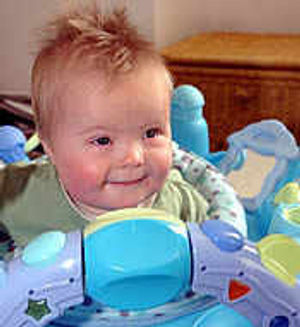
Now Claire wants to raise more awareness about the condition. "This week is Down's Syndrome Awareness Week," she says. "George was actually due on the first day of Awareness Week last year - June 5 - and was born on the last day - June 11. I hadn't read anything about it - if I had it would have made me feel a bit easier and not so alone.
"Now I do not feel upset or cheated. I'm glad he was given to us and not someone else. Wayne said whatever he imagined being a dad would be like, George has totally exceeded that. We just love him for who he is and deal with things as they come.
"We were devastated initially when he was born as it was all unknown to us and we just didn't know what to expect. But nearly 12 months on, life with George is brilliant and we wouldn't be without him."
* For more information on support call Down's Syndrome Shropshire Group on (01939) 270477 or visit the website www.downs-syndrome.org.uk; to contact Claire see www.upfordowns.co.uk
Factfile:
Down's syndrome is a genetic condition. Most people have 46 chromosomes in their body cells. Those people with Down's syndrome have one extra chromosome, making 47.
People with Down's syndrome all have a certain degree of learning disability. The degree of disability varies from person to person and it is impossible to tell at birth what that degree might be.
Nothing done before or during pregnancy causes Down's syndrome. It occurs in all races, in all social classes and in all countries.
All people with Down's syndrome share certain physical characteristics, though not every child with the condition has every characteristic.
A baby may have looser muscles and joints, a lower-than-average birth weight, eyes which slant upward and outward, the back of the head may be flatter than average, and many babies with Down's syndrome have a single crease which runs right across the palm of the hand.
Children with Down's syndrome have an increased likelihood of a variety of congenital abnormalities including heart problems and cataracts.
There are three types of Down's syndrome. Most people with the condition have regular trisomy 21. Much smaller numbers have Translocation or Mosaic Down's syndrome.
It is not just older mums who are at risk of having a child with the condition - it can happen to any couple.
By Rebecca Lawrence


